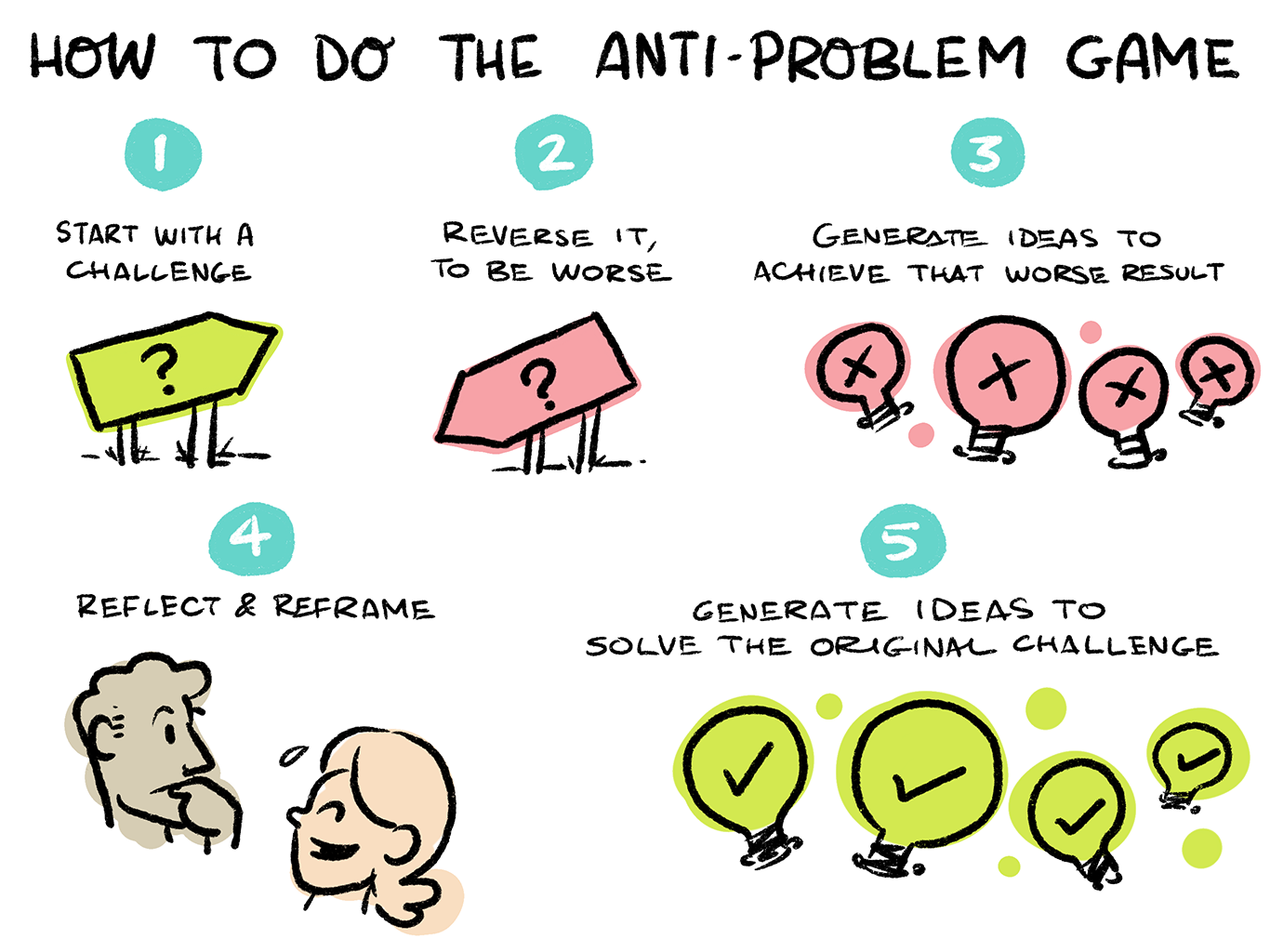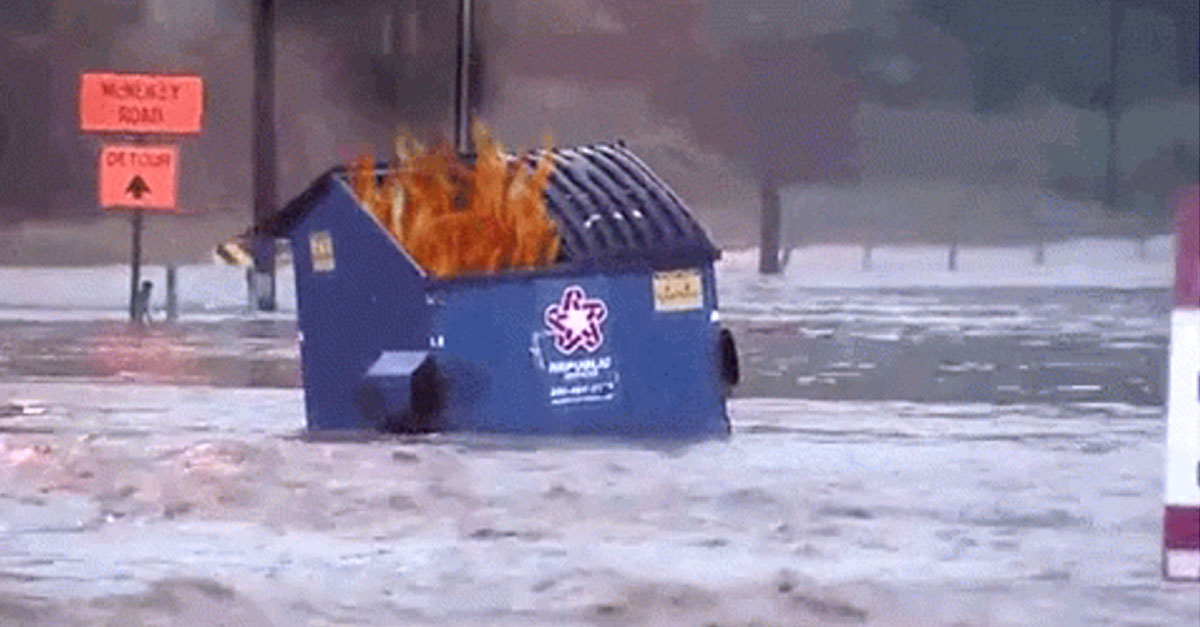Oh joy! It's brainstorming time
As I've written about before, the word ‘brainstorming’ can really polarise people. Some people are ever-optimistic, hoping that this time we find the road to the Beautiful Valley of Great Ideas. Others are - ahem - not so optimistic, and have given up trying to find that road, thanks to the mess of constraints, previously failed attempts, broken promises and other bad experiences in the way.
Brainstorming - as in: a group trying to come up with genuinely new ideas - can be great, despite the bad press. It is worth it. And my own hot take is that the process of trying to generate ideas together is actually just as important as the product itself, i.e. the ideas you get out of the process. It's an important part of teaming and collaboration.
It takes courage. It takes optimism. It takes everybody to be in the same mindset, and believe that they can do it.
Enter: the anti-problem game
If only there was a brainstorming activity that helped us get courageous and optimistic! If only there was an activity that united us, rather than divided us! Well, good news; that activity is what Gamestorming calls the ‘Anti-Problem’ game, or the ‘Worst First’ game. It was a highlight in the recent Gamestorming Excursion workshops that Dave Mastronardi and I ran, on how to make hybrid work better.
Rather than trying to come up with ideas to solve a challenge, you come up with ideas to make it WORSE.
The trick with this activity is that it gives everybody permission to get their fears and cynicism out first. All those blockers on the road to the Beautiful Valley of Great Ideas? Yeah, those ones. It brings the oxygen back into discussions about how to solve what often seem to be insurmountable challenges and blockers, because it helps us to see those challenges and blockers in new ways.
It's also fast and fun.

Here's how you do it:
- Start with a challenge of some sort that you need ideas for, such as a problem to solve, or a feature/ product/ service to improve
- Reverse the challenge into something to make it WORSE. The more extreme the better.
- Come up with ideas to achieve that WORSE outcome or result. Again, the more extreme and stupid, the better.
- Look at all those ideas, and think about why those ideas are so funny, extreme, and impractical. This should lead to insights about the challenge that may never have occurred to you before.
- Now, think about flipping the worse ideas, and write down some ideas to make the challenge better.
Example of the anti-problem game in action
1. Challenge: How can we encourage people to return to working at the office?
2. Reverse: How can we discourage - no, worse, PREVENT people working at the office?
3. Ideas:
- Dock people's pay if they come in
- Spray smelly toxic fumes around
- Install spikes on the office chairs
- Publicly shame people if they're seen being in the office
- Keep changing passwords and the security keycard system, so people can't enter the building
Get the idea? It was definitely fun typing those "solutions'"¦!
4. Think: As I look at these "solutions', it occurs to me that:
- People have lots of intrinsic motivations about working, as well as extrinsic (e.g. pay). What could we do that meets people's intrinsic needs?
- People like environments that are safe, calming, and good for the senses. What could we do to make office environments more safe, calming, and good for the senses? (notice: I didn't say ‹more like home’).
- People like to be rewarded, not shamed. What could we do to reward people for being in the office?
- People understand that some aspects of office life (e.g. security) are necessary, but they don't want these things getting in their way of working, and performing well. What can we do to take the hassle out of these "must-have' aspects?
Looking at all of these insights, it should make a group challenge the challenge as well. Why do we want to encourage people to return to working in the office? Are we facing up to the right challenge in the first place?
Advantages of the anti-problem game
It's perfect as a 5-minute creativity warm-up in any meeting or workshop. Tons of times I've started a design workshop by asking the group to come up with the WORST SIGN-UP FORM POSSIBLE. The more stupid and annoying the "solution', the better. People have a ball with this one, without fail.
It helps get a group un-stuck, especially if they're too familiar with the challenge (and/or they've been around and around on it for ages, without coming up with anything new). This fresh take on can old problem can yield new insights and new directions.
But here's why I enjoy this activity so much: it gives everybody permission to talk about the tricky topics. By reframing challenges in this way, you give everybody a light-hearted "friendly way in' to approach often very serious topics.
You know the ones. The topics your colleagues use air quotes about in meetings. The things that everybody shrugs and goes dead-eyed about. Goals that aren't being achieved. Bad bosses. Slippery stakeholders. Dud decisions. Big gnarly issues that affect everybody but are owned by nobody.
Try it!
This is my challenge to you this week. Next time the hoary rump of a Topic That Must Not Be Named starts suffocating the conversation in a meeting, make a game out of it, and ask everyone how would they make it HEAPS WORSE? Everybody will be pleasantly surprised and relieved at the fun, safety and trust the conversation actually generates.
As author Katie M. John is to have said, “A problem shared is a problem halved”.
